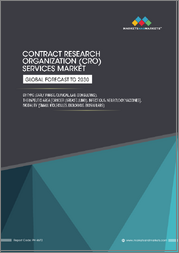
|
시장보고서
상품코드
1771487
마이크로바이옴 분석 시장 : 규모, 점유율, 동향 분석(제품 및 서비스별, 기술별, 최종 용도별, 지역별), 부문별 예측(2025-2030년)Microbiome Analysis Market Size, Share & Trends Analysis Report, By Product & Services, By Technology, By Application, By End Use, By Region, And Segment Forecasts, 2025 - 2030 |
||||||
마이크로바이옴 분석 시장의 성장과 동향 :
Grand View Research, Inc.의 최신 보고서에 따르면 세계의 마이크로바이옴 분석 시장 규모는 2030년까지 22억 6,000만 달러에 달하고, 2025년부터 2030년까지의 CAGR은 10.47%를 보일 것으로 예측됩니다. 뿐만 아니라 만성 질환의 확산, 의약품 개발 용도의 확대, 시퀀싱 및 바이오인포매틱스의 기술 진보에 의해 초래됩니다.
마이크로바이옴 분석 시장은 학술계, 산업계, 규제기관의 제휴 강화에 견인되어 급속히 진화하고 있습니다. 인간 마이크로바이옴의 역할에 대한 이해가 높아짐으로써, 마이크로바이옴 분석 기술에 대한 투자와 기술 혁신을 뒷받침하고 있습니다. 이 시장은 질병 진단, 맞춤형 의료, 의약품 개발, 영양학 연구에의 폭넓은 응용에 의해 강한 기세를 보이고 있습니다.
차세대 시퀀서(NGS), 바이오인포매틱스, 대사체학의 진보에 의해 마이크로바이옴 분석의 정밀도와 접근성이 대폭 향상하고 있습니다. 염증성 장질환, 비만, 당뇨병, 암, 신경질환과 관련된 미생물 시그니처를 밝힐 수 있습니다.그 결과, 마이크로바이옴 연구는 학술기관으로부터 임상이나 상업적인 이용 사례로 이행하고 있습니다.
그러나, 방법론이 표준화되어 있지 않은 것, 임상 검증이 한정적인 것, 규제가 모호한 것 등이 시장의 성장을 억제하고 있습니다. 또한 첨단 멀티오믹스 기술과 복잡한 데이터 분석과 관련된 높은 비용도 널리 보급되고 있습니다. 게다가, 특히 소비자 직접 검사에 있어서의 데이터 프라이버시를 둘러싼 우려나 결과가 일관되지 않는 것에 의한 임상의의 회의적인 견해가, 마이크로바이옴 분석을 주류의 헬스 케어나 진단에 통합하는데 있어서의 과제가 되고 있습니다.
마이크로바이옴 분석 시장 : 분석 개요
- 제품 및 서비스별로는 소모품이 2024년 매출 점유율 46.47%로 시장을 독점하고 있습니다. 이 이점은 주로 DNA 추출, 라이브러리 준비, 증폭에 필수적인 시약, 키트 및 기타 연구 자료의 지속적인 수요 때문입니다. 그러나 서비스는 예측 기간 동안 11.55%의 연평균 복합 성장률(CAGR)로 가장 빠르게 성장할 것으로 예측됩니다.
- 기술별로 16S rRNA 시퀀싱은 2024년 시장을 선도했습니다. 그 이유는 비용 효과, 학술 및 임상 연구에서의 광범위한 채택, 다양한 샘플 유형에 걸친 박테리아 군중의 동정에 대한 신뢰성입니다. 그러나shotgun metagenomics는 예측 기간 동안 가장 빠른 CAGR로 성장할 것으로 예측됩니다.
- 용도별로는 연구 용도가 2024년 마이크로바이옴 분석 시장을 견인했습니다. 이 성장의 원동력이 되고 있는 것은 학술 자금 증가와 마이크로바이옴 기반의 질환 메커니즘에 대한 관심 증가입니다. 그러나 질병 용도는 예측 기간 동안 가장 빠른 CAGR로 성장할 것으로 예측됩니다.
- 최종 용도별로 학술연구기관은 2024년 마이크로바이옴 분석 시장을 선도했습니다. 그 이점은 왕성한 연구 자금, 광범위한 마이크로바이옴 조사, 고급 시퀀싱 기술에 대한 접근으로 인한 것입니다. 그러나 CRO& CMO는 예측 기간 동안 가장 빠른 CAGR로 성장할 것으로 예측됩니다.
- 지역별로는 북미가 2024년에 42.81%의 점유율로 마이크로바이옴 분석 시장을 독점해 강력한 연구 인프라, 높은 헬스케어 지출, 주요 시장 기업와 고도의 시퀀싱 시설의 존재가 그 원동력이 되고 있습니다.
목차
제1장 분석 방법·범위
제2장 주요 요약
제3장 시장의 변동 요인, 경향, 범위
- 시장 연관 전망
- 상위 시장 전망
- 관련/부수 시장 전망
- 시장 역학
- 시장 성장 촉진요인 분석
- 시장 성장 억제요인 분석
- 마이크로바이옴 분석 시장 : 분석 툴
- 업계 분석 : Porter's Five Forces 분석
- PESTEL 분석
- COVID-19의 영향 분석
제4장 마이크로바이옴 분석 시장 : 제품 및 서비스별 비즈니스 분석
- 부문 대시보드 : 제품 및 서비스별
- 세계의 마이크로바이옴 분석 시장의 변동 분석 : 제품 및 서비스별
- 세계의 마이크로바이옴 분석 시장 규모와 동향 분석 : 제품 및 서비스별(2018-2030년)
- 기기
- 소모품
- 서비스
제5장 마이크로바이옴 분석 시장 : 기술별 비즈니스 분석
- 부문 대시보드 : 기술별
- 세계의 마이크로바이옴 분석 시장의 변동 분석 : 기술별
- 세계의 마이크로바이옴 분석 시장 규모와 동향 분석 :기술별(2018-2030년)
- 16S rRNA 시퀀싱
- 샷건 군유전체학
- 메타전사체학
- 기타
제6장 마이크로바이옴 분석 시장 : 용도별 비즈니스 분석
- 부문 대시보드 : 용도별
- 세계의 마이크로바이옴 분석 시장의 변동 분석 : 용도별
- 세계의 마이크로바이옴 분석 시장 규모와 동향 분석 : 용도별(2018-2030년)
- 질병 용도
- 연구 용도
제7장 마이크로바이옴 분석 시장 : 최종 용도별 비즈니스 분석
- 부문 대시보드 : 최종 용도별
- 세계의 마이크로바이옴 분석 시장의 변동 분석 : 최종 용도별
- 세계의 마이크로바이옴 분석 시장 규모와 동향 분석 : 최종 용도별(2018-2030년)
- 바이오의약품 및 제약회사
- CRO 및 CMO
- 학술연구기관
- 기타
제8장 마이크로바이옴 분석 시장 : 지역별 추정 및 예측 분석
- 북미
- 미국
- 캐나다
- 멕시코
- 유럽
- 영국
- 독일
- 프랑스
- 이탈리아
- 스페인
- 노르웨이
- 스웨덴
- 덴마크
- 아시아태평양
- 일본
- 중국
- 인도
- 태국
- 한국
- 호주
- 라틴아메리카
- 브라질
- 아르헨티나
- 중동 및 아프리카
- 남아프리카
- 사우디아라비아
- 아랍에미리트(UAE)
- 쿠웨이트
제9장 경쟁 구도
- 기업 분류
- 전략 매핑
- 기업시장 포지셔닝 분석(2024년)
- 기업 프로파일/상장 기업
- Genetic Analysis AS
- Zymo Research Corporation
- Microbiome Insights
- . Viome Life Sciences, Inc.
- Microba Life Science
- Luxia Scientific
- DNA Genotek
- Sun Genomics
- CosmosID
- MaaT Pharma
Microbiome Analysis Market Growth & Trends:
The global microbiome analysis market size is projected to reach USD 2.26 billion by 2030, and is projected to grow at a CAGR of 10.47% from 2025 to 2030, according to a new report by Grand View Research, Inc. This growth is driven by rising demand for personalized medicine, increasing chronic disease prevalence, expanding drug development applications, and technological advancements in sequencing and bioinformatics. Strategic collaborations and outsourcing to CROs/CMOs are further accelerating market expansion across both research and clinical domains.
The microbiome analysis market is rapidly evolving, driven by increased collaboration between academia, industry, and regulatory bodies. Innovations in data analytics, sequencing technology, and machine learning are enhancing the accuracy and scalability of microbiome research. Moreover, the growing understanding of the human microbiome's role in health and disease drives investment and innovation in microbiome analysis technologies. This market is experiencing strong momentum due to its wide applications in disease diagnostics, personalized medicine, drug development, and nutritional studies.
Advances in next-generation sequencing (NGS), bioinformatics, and metabolomics have significantly enhanced the precision and accessibility of microbiome analysis. These developments enable researchers and clinicians to uncover microbial signatures linked to inflammatory bowel disease, obesity, diabetes, cancer, and neurological disorders. As a result, microbiome research is transitioning from academic institutions to clinical and commercial use cases.
However, market growth is restrained by the lack of standardization in methodologies, limited clinical validation, and regulatory ambiguity. High costs associated with advanced multi-omics technologies and complex data interpretation also hinder widespread adoption. Additionally, concerns around data privacy, particularly in direct-to-consumer testing, and skepticism among clinicians due to inconsistent outcomes continue to challenge the integration of microbiome analysis into mainstream healthcare and diagnostics.
Microbiome Analysis Market Report Highlights:
- Based on product & services, consumables dominated the market with a revenue share of 46.47% in 2024. This dominance is primarily due to the recurring demand for reagents, kits, and other lab materials essential for DNA extraction, library preparation, and amplification. However, services are anticipated to grow at the fastest CAGR of 11.55% over the forecast period.
- Based on technology, 16S rRNA sequencing led the market in 2024, attributed to its cost-effectiveness, widespread academic and clinical research adoption, and reliability in identifying bacterial communities across diverse sample types. However, shotgun metagenomics is anticipated to grow at the fastest CAGR over the forecast period.
- Based on application, research applications led the microbiome analysis market in 2024. This growth is driven by increased academic funding and rising interest in microbiome-based disease mechanisms. However, disease application is anticipated to grow at the fastest CAGR over the forecast period.
- Based on end use, academic & research institutes led the microbiome analysis market in 2024. Their dominance is attributed to the robust research funding, extensive microbiome studies, and access to advanced sequencing technologies. However, CROs & CMOs are anticipated to grow at the fastest CAGR over the forecast period.
- Based on region, the North America region dominated the microbiome analysis market with a 42.81% share in 2024, driven by strong research infrastructure, high healthcare spending, and the presence of key market players and advanced sequencing facilities. Asia Pacific is anticipated to grow at the fastest CAGR over the forecast period.
Table of Contents
Chapter 1. Methodology and Scope
- 1.1. Market Segmentation and Scope
- 1.2. Market Definitions
- 1.2.1. Product & Services Segment
- 1.2.2. Technology Segment
- 1.2.3. Application Segment
- 1.2.4. End Use Segment
- 1.3. Information analysis
- 1.4. Market formulation & data visualization
- 1.5. Data validation & publishing
- 1.6. Information Procurement
- 1.6.1. Primary Research
- 1.7. Information or Data Analysis
- 1.8. Market Formulation & Validation
- 1.9. Market Model
- 1.10. Objectives
Chapter 2. Executive Summary
- 2.1. Market Outlook
- 2.2. Segment Snapshot
- 2.3. Competitive Landscape Snapshot
Chapter 3. Market Variables, Trends, & Scope
- 3.1. Market Lineage Outlook
- 3.1.1. Parent market outlook
- 3.1.2. Related/ancillary market outlook
- 3.2. Market Dynamics
- 3.2.1. Market driver analysis
- 3.2.1.1. Advancements in sequencing technologies
- 3.2.1.2. Expansion of microbiome research programs
- 3.2.2. Market restraint analysis
- 3.2.2.1. High complexity of data analysis
- 3.2.1. Market driver analysis
- 3.3. Microbiome Analysis Market Analysis Tools
- 3.3.1. Industry Analysis - Porter's
- 3.3.2. PESTEL Analysis
- 3.3.3. COVID-19 Impact Analysis
Chapter 4. Microbiome Analysis Market: Product & Services Business Analysis
- 4.1. Product & Services Segment Dashboard
- 4.2. Global Microbiome Analysis Market Product & Services Movement Analysis
- 4.3. Global Microbiome Analysis Market Size & Trend Analysis, by Product & Services, 2018 to 2030 (USD Million)
- 4.4. Instruments
- 4.4.1. Global Instruments Market, 2018 - 2030 (USD Million)
- 4.5. Consumables
- 4.5.1. Global Consumables Market, 2018 - 2030 (USD Million)
- 4.6. Services
- 4.6.1. Global Services Market, 2018 - 2030 (USD Million)
Chapter 5. Microbiome Analysis Market: Technology Business Analysis
- 5.1. Technology Segment Dashboard
- 5.2. Global Microbiome Analysis Market Technology Movement Analysis
- 5.3. Global Microbiome Analysis Market Size & Trend Analysis, by Technology, 2018 to 2030 (USD Million)
- 5.4. 16S rRNA Sequencing
- 5.4.1. Global 16S rRNA Sequencing Market, 2018 - 2030 (USD Million)
- 5.5. Shotgun Metagenomics
- 5.5.1. Global Shotgun Metagenomics Market, 2018 - 2030 (USD Million)
- 5.6. Metatranscriptomics
- 5.6.1. Global Metatranscriptomics Market, 2018 - 2030 (USD Million)
- 5.7. Others
- 5.7.1. Global Others Market, 2018 - 2030 (USD Million)
Chapter 6. Microbiome Analysis Market: Application Business Analysis
- 6.1. Application Segment Dashboard
- 6.2. Global Microbiome Analysis Market Application Movement Analysis
- 6.3. Global Microbiome Analysis Market Size & Trend Analysis, by Application, 2018 to 2030 (USD Million)
- 6.4. Disease Application
- 6.4.1. Global Disease Application Market, 2018 - 2030 (USD Million)
- 6.4.2. Gastrointestinal Disorders
- 6.4.2.1. Global Gastrointestinal Disorders Market, 2018 - 2030 (USD Million)
- 6.4.3. Metabolic Disorders
- 6.4.3.1. Global Metabolic Disorders Market, 2018 - 2030 (USD Million)
- 6.4.4. Infectious Diseases
- 6.4.4.1. Global Infectious Diseases Market, 2018 - 2030 (USD Million)
- 6.4.5. Oncology
- 6.4.5.1. Global Oncology Market, 2018 - 2030 (USD Million)
- 6.4.6. Others
- 6.4.6.1. Global Others Market, 2018 - 2030 (USD Million)
- 6.5. Research Application
- 6.5.1. Global Research Application Market, 2018 - 2030 (USD Million)
Chapter 7. Microbiome Analysis Market: End Use Business Analysis
- 7.1. End Use Segment Dashboard
- 7.2. Global Microbiome Analysis Market End Use Movement Analysis
- 7.3. Global Microbiome Analysis Market Size & Trend Analysis, by End Use, 2018 to 2030 (USD Million)
- 7.4. Biopharmaceutical & Pharmaceutical Companies
- 7.4.1. Global Biopharmaceutical & Pharmaceutical Companies Devices Market, 2018 - 2030 (USD Million)
- 7.5. CROs & CMOs
- 7.5.1.1. Global CROs & CMOs Market, 2018 - 2030 (USD Million)
- 7.6. Academic & Research Institutes
- 7.6.1.1. Global Academic & Research Institutes Market, 2018 - 2030 (USD Million)
- 7.7. Others
- 7.7.1. Global Others Market, 2018 - 2030 (USD Million)
Chapter 8. Regional Microbiome Analysis Market: Region Estimates & Trend Analysis
- 8.1. North America
- 8.1.1. North America market estimates and forecasts 2018 - 2030 (USD Million)
- 8.1.2. U.S.
- 8.1.2.1. Key country dynamics
- 8.1.2.2. Competitive scenario
- 8.1.2.3. Regulatory Framework
- 8.1.2.4. U.S. market estimates and forecasts 2018 - 2030 (USD Million)
- 8.1.3. Canada
- 8.1.3.1. Key country dynamics
- 8.1.3.2. Competitive scenario
- 8.1.3.3. Regulatory Framework
- 8.1.3.4. Canada market estimates and forecasts 2018 - 2030 (USD Million)
- 8.1.4. Mexico
- 8.1.4.1. Key country dynamics
- 8.1.4.2. Competitive scenario
- 8.1.4.3. Regulatory Framework
- 8.1.4.4. Mexico market estimates and forecasts 2018 - 2030 (USD Million)
- 8.2. Europe
- 8.2.1. Europe market estimates and forecasts 2018 - 2030 (USD Million)
- 8.2.2. UK
- 8.2.2.1. Key country dynamics
- 8.2.2.2. Competitive scenario
- 8.2.2.3. Regulatory Framework
- 8.2.2.4. UK market estimates and forecasts 2018 - 2030 (USD Million)
- 8.2.3. Germany
- 8.2.3.1. Key country dynamics
- 8.2.3.2. Competitive scenario
- 8.2.3.3. Regulatory Framework
- 8.2.3.4. Germany market estimates and forecasts 2018 - 2030 (USD Million)
- 8.2.4. France
- 8.2.4.1. Key country dynamics
- 8.2.4.2. Competitive scenario
- 8.2.4.3. Regulatory Framework
- 8.2.4.4. France market estimates and forecasts 2018 - 2030 (USD Million)
- 8.2.5. Italy
- 8.2.5.1. Key country dynamics
- 8.2.5.2. Competitive scenario
- 8.2.5.3. Regulatory Framework
- 8.2.5.4. Italy market estimates and forecasts 2018 - 2030 (USD Million)
- 8.2.6. Spain
- 8.2.6.1. Key country dynamics
- 8.2.6.2. Competitive scenario
- 8.2.6.3. Regulatory Framework
- 8.2.6.4. Spain market estimates and forecasts 2018 - 2030 (USD Million)
- 8.2.7. Norway
- 8.2.7.1. Key country dynamics
- 8.2.7.2. Competitive scenario
- 8.2.7.3. Regulatory Framework
- 8.2.7.4. Norway market estimates and forecasts 2018 - 2030 (USD Million)
- 8.2.8. Sweden
- 8.2.8.1. Key country dynamics
- 8.2.8.2. Competitive scenario
- 8.2.8.3. Regulatory Framework
- 8.2.8.4. Sweden market estimates and forecasts 2018 - 2030 (USD Million)
- 8.2.9. Denmark
- 8.2.9.1. Key country dynamics
- 8.2.9.2. Competitive scenario
- 8.2.9.3. Regulatory Framework
- 8.2.9.4. Denmark market estimates and forecasts 2018 - 2030 (USD Million)
- 8.3. Asia Pacific
- 8.3.1. Asia Pacific market estimates and forecasts 2018 - 2030 (USD Million)
- 8.3.2. Japan
- 8.3.2.1. Key country dynamics
- 8.3.2.2. Competitive scenario
- 8.3.2.3. Regulatory Framework
- 8.3.2.4. Japan market estimates and forecasts 2018 - 2030 (USD Million)
- 8.3.3. China
- 8.3.3.1. Key country dynamics
- 8.3.3.2. Competitive scenario
- 8.3.3.3. Regulatory Framework
- 8.3.3.4. China market estimates and forecasts 2018 - 2030 (USD Million)
- 8.3.4. India
- 8.3.4.1. Key country dynamics
- 8.3.4.2. Competitive scenario
- 8.3.4.3. Regulatory Framework
- 8.3.4.4. India market estimates and forecasts 2018 - 2030 (USD Million)
- 8.3.5. Thailand
- 8.3.5.1. Key country dynamics
- 8.3.5.2. Competitive scenario
- 8.3.5.3. Regulatory Framework
- 8.3.5.4. Thailand market estimates and forecasts 2018 - 2030 (USD Million)
- 8.3.6. South Korea
- 8.3.6.1. Key country dynamics
- 8.3.6.2. Competitive scenario
- 8.3.6.3. Regulatory Framework
- 8.3.6.4. South Korea market estimates and forecasts 2018 - 2030 (USD Million)
- 8.3.7. Australia
- 8.3.7.1. Key country dynamics
- 8.3.7.2. Competitive scenario
- 8.3.7.3. Regulatory Framework
- 8.3.7.4. Australia market estimates and forecasts 2018 - 2030 (USD Million)
- 8.4. Latin America
- 8.4.1. Latin America market estimates and forecasts 2018 - 2030 (USD Million)
- 8.4.2. Brazil
- 8.4.2.1. Key country dynamics
- 8.4.2.2. Competitive scenario
- 8.4.2.3. Regulatory Framework
- 8.4.2.4. Brazil market estimates and forecasts 2018 - 2030 (USD Million)
- 8.4.3. Argentina
- 8.4.3.1. Key country dynamics
- 8.4.3.2. Competitive scenario
- 8.4.3.3. Regulatory Framework
- 8.4.3.4. Argentina market estimates and forecasts 2018 - 2030 (USD Million)
- 8.5. Middle East & Africa
- 8.5.1. Middle East & Africa market estimates and forecasts 2018 - 2030 (USD Million)
- 8.5.2. South Africa
- 8.5.2.1. Key country dynamics
- 8.5.2.2. Competitive scenario
- 8.5.2.3. Regulatory Framework
- 8.5.2.4. South Africa market estimates and forecasts 2018 - 2030 (USD Million)
- 8.5.3. Saudi Arabia
- 8.5.3.1. Key country dynamics
- 8.5.3.2. Competitive scenario
- 8.5.3.3. Regulatory Framework
- 8.5.3.4. Saudi Arabia market estimates and forecasts 2018 - 2030 (USD Million)
- 8.5.4. UAE
- 8.5.4.1. Key country dynamics
- 8.5.4.2. Competitive scenario
- 8.5.4.3. Regulatory Framework
- 8.5.4.4. UAE market estimates and forecasts 2018 - 2030 (USD Million)
- 8.5.5. Kuwait
- 8.5.5.1. Key country dynamics
- 8.5.5.2. Competitive scenario
- 8.5.5.3. Regulatory Framework
- 8.5.5.4. Kuwait market estimates and forecasts 2018 - 2030 (USD Million)
Chapter 9. Competitive Landscape
- 9.1. Company Categorization
- 9.2. Strategy Mapping
- 9.3. Company Market Position Analysis, 2024
- 9.4. Company Profiles/Listing
- 9.4.1. Genetic Analysis AS
- 9.4.1.1. Overview
- 9.4.1.2. Financial Performance
- 9.4.1.3. Product & Services Benchmarking
- 9.4.1.4. Strategic Initiatives
- 9.4.2. Zymo Research Corporation
- 9.4.2.1. Overview
- 9.4.2.2. Financial Performance
- 9.4.2.3. Product & Services Benchmarking
- 9.4.2.4. Strategic Initiatives
- 9.4.3. Microbiome Insights
- 9.4.3.1. Overview
- 9.4.3.2. Financial Performance
- 9.4.3.3. Product & Services Benchmarking
- 9.4.3.4. Strategic Initiatives
- 9.4.4. . Viome Life Sciences, Inc.
- 9.4.4.1. Overview
- 9.4.4.2. Financial Performance
- 9.4.4.3. Product & Services Benchmarking
- 9.4.4.4. Strategic Initiatives
- 9.4.5. Microba Life Science
- 9.4.5.1. Overview
- 9.4.5.2. Financial Performance
- 9.4.5.3. Product & Services Benchmarking
- 9.4.5.4. Strategic Initiatives
- 9.4.6. Luxia Scientific
- 9.4.6.1. Overview
- 9.4.6.2. Financial Performance
- 9.4.6.3. Product & Services Benchmarking
- 9.4.6.4. Strategic Initiatives
- 9.4.7. DNA Genotek
- 9.4.7.1. Overview
- 9.4.7.2. Financial Performance
- 9.4.7.3. Product & Services Benchmarking
- 9.4.7.4. Strategic Initiatives
- 9.4.8. Sun Genomics
- 9.4.8.1. Overview
- 9.4.8.2. Financial Performance
- 9.4.8.3. Product & Services Benchmarking
- 9.4.8.4. Strategic Initiatives
- 9.4.9. CosmosID
- 9.4.9.1. Overview
- 9.4.9.2. Financial Performance
- 9.4.9.3. Product & Services Benchmarking
- 9.4.9.4. Strategic Initiatives
- 9.4.10. MaaT Pharma
- 9.4.10.1. Overview
- 9.4.10.2. Financial Performance
- 9.4.10.3. Product & Services Benchmarking
- 9.4.10.4. Strategic Initiatives
- 9.4.1. Genetic Analysis AS
(주말 및 공휴일 제외)


















